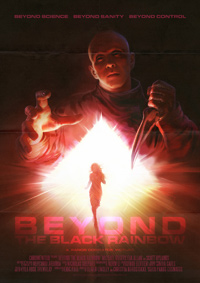This is a story about control: Cosmatos’ Throwback a Challenging Piece of Psychedilia
Words cannot rightfully describe Beyond the Black Rainbow, the debut of filmmaker Panos Cosmatos (the son of George Cosmatos of Rambo: First Blood Part II and Tombstone fame), a film that’s obviously imbued and informed by several notable filmmakers yet never actually pays homage to any particular film. Rather, Cosmatos has created a nightmarish world that’s aggravating, hypnotic, and original. While he may not surpass David Lynch in the epitome of the art house mindfuck, he comes close with a film that’s more than a feeling—it’s a state of mind.
Crimson numerals inform us that it’s 1983 and infomercial footage of Mercurio Arboria (Scott Hylands) explains what his Arborian Institute has to offer, namely “a state of mind, a way of being,” with the methods he has developed to create a “happier you” with “serenity through technology.” Inside the institute, we meet Barry Nye (Michael Rogers), a malevolent doctor observing a mute young woman Elena (Eva Allan) from behind see-though walls. We learn that the captive young woman’s emotions are perhaps being drained by the large, glowing pyramid (recalling The Dark Crystal) within the institute while Barry attempts to cause an emotional response in Elena, who seems only capable of tears. When Barry’s assistant Margo (Rondel Reynoldson) discovers a strange book with eerie pictures of impregnated women, strange medical jargon, and foreboding vaginas, she suspects that something strange may be going on with Elena, so Barry tricks Margo into a confrontation with Elena, which involves a picture of the young girl’s mother. Afterwards, any sense of narrative formula dissolves and we only sense that Elena has recovered enough emotional intelligence to attempt to escape the institute, while we are treated to the batshit crazy mind of Barry and his strange existence. A meeting with the ailing Mercurio jolts Barry’s mind back to a happier time in 1966, when he may have met a God-like being that may or may not have experimented on him. Whatever may have happened, it has shaped the existence of Mercurio, Barry, and the mysterious Elena. And when Barry’s eyes turn jet black and he removes his worldly “appliances,” you know the outcome won’t be good.
While there’s an aggravating lack of narrative cohesion in Beyond the Black Rainbow, its dense symbolism and vague allegories do hint that there’s plenty of substance under the surface. Cosmatos has filled plenty of his shots to include their reflections, repeating various mirror images throughout the film, with red square buttons that become green square buttons (not to mention the significance of a black rainbow, an ominous reflection of a positive symbol, the other side of hope). And while the film leads up to a glacially paced escape, it’s notable that he includes so many reflections in his shots—their reflections are continually escaping. Likewise, Cosmatos includes angles and shots from all possible perspectives, flashing from grainy shots of Elena through cameras and monitors, never letting her image escape. With bites of Ronald Reagan on their 1983 television sets, it’s no coincidence that this is a story about control, about a time and place where the only emotions that cannot be suppressed are fear and sadness.
The superb cinematography of Norm Li is especially noteworthy in Beyond the Black Rainbow, recalling 70’s giallo titles from Bava or Argento. The delicious synthetic score and the surreal mise en scene recall Cronenberg (Scanners, Videodrome) mixed with the moody mindfuckery of Lynch. Throw in some Tron, THX 1138, and Kubrick and you have an idea of what Cosmatos’ film will bring to mind yet never recreate. Many will find Beyond the Black Rainbow to be like a hallucinogenic trip, but the film doesn’t quite reach levels of trippiness, at least not to the extent of Gaspar Noe’s Enter the Void. Instead, Rainbow, with all its delirious close-ups and menacing atmosphere, feels like a brooding nightmare, one that will pierce several images into your mind but will never be memorable as a whole. One must certainly appreciate the dark beauty of Cosmatos’ first effort, a film that certainly distances him from the lukewarm legacy of his father’s own directorial career. But one cannot be blamed for wanting just a little bit more by the final frame, just something to solidify that appreciation into something more tangible than that vaporous unease that disappears when you wake up.



